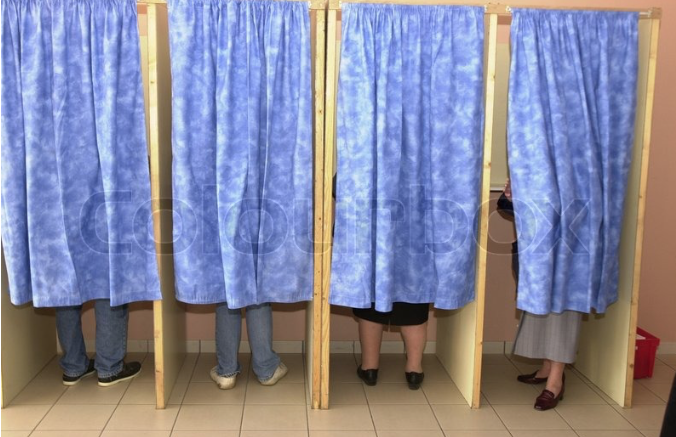CommentsGELFAND’S WORLD--As a kid, I can remember walking down to the corner one evening with my parents.
We entered a neighbor's driveway and walked into an open garage. It was the process of voting on election day, and I was allowed to come watch. Voting was what people did on election day. It was something of a family event for us. (Photo above: Voting booth 40 years ago.)
Admittedly, my parents came originally from a midwestern city which was run by one of the Democratic Party machines. Loyal Democrats got certain perks. As my father told us, nobody in the family ever had to pay a parking ticket back there. But in exchange for a certain amount of petty patronage, citizens of the metropolis got a city that worked and that kept people employed. The party machine was dedicated to finding jobs for those who needed them. Admittedly the municipal government wasn't gung-ho about enforcing prohibition, but apparently that was the case in much of America at the time.
One effect of Democratic Party machines was that the New Deal was allowed to develop and survive in the Great Depression. If it hadn't been for those political machines (both on the local and the statewide level), conservatives would have pulled back on the reins of New Deal programs. Thousands more people would have gone hungry.
The political climate reflected the existence of lots of industrial cities in America's heartland that contained substantial unionized labor forces and the political organizations that supported them.
It's true that the major party machines did a substantial amount of getting out the vote, but this was a project that was part of a wider culture in which people understood that they were part of a larger political movement and that they belonged to a tradition of voting. It's not clear that the voters understood that their votes were part of a massive ideological movement, but they did understand that delivering their votes was part of their overall lives and possibly to their benefit.
In other words, a lot of voters were in effect good soldiers in the political wars, and they followed what they saw as their duty, particularly in unionized households. This was understood.
We've really dropped the ball on voting in the current culture. It shouldn't be just a matter of coming out to vote for one presidential candidate every eight or sixteen years. It's a matter of coming out to vote each and every election for the rest of your life. To be blunt (and taking a page from Kevin Drum and other educated pundits), it's a matter of going to the polls and voting for Democrats each and every time. The alternative is that Republicans will continue to vote for the interests of the very rich and the very socially conservative.
I've recently been reading about activist movements that are trying to get people to vote in the midterms. It's remarkable that any such thing is even necessary. All the people whose ancestors had to struggle and suffer to be allowed to vote (women for example) ought to understand at the gut level that they have interests of their own and that the only people who will defend those interests are themselves and their fellow voters.
We certainly failed to uphold those interests in 2016. I can remember the days after the November election in which large protest groups marched city streets in protest of Trump's election. It was remarkable to hear one of the protesters insisting that we needed to have a redo of the national election. Considering that we've been holding national elections without cease and without a redo since 1789, the idea was preposterous.
The liberal side (or let them call themselves progressives if they wish) could take charge if only people would come out to vote. It's not unlikely that there is in fact a substantial majority of liberals who, if only they would vote, could enforce a less restrictive view of government and humanism.
It's curious that for all the talk going back to the 1950s about electoral and governmental reform, the liberal movement has failed to enact a long-term strategy for convincing people to vote in each and every election. Yes, the wealthy conservative interests have been active in voter suppression during the same period, but the decreasing influence of the left should have been enough of a signal.
One start -- parents should take their children with them to the polls and should explain that voting is what you do as an American.
(Bob Gelfand writes on science, culture, and politics for CityWatch. He can be reached at [email protected])
-cw















